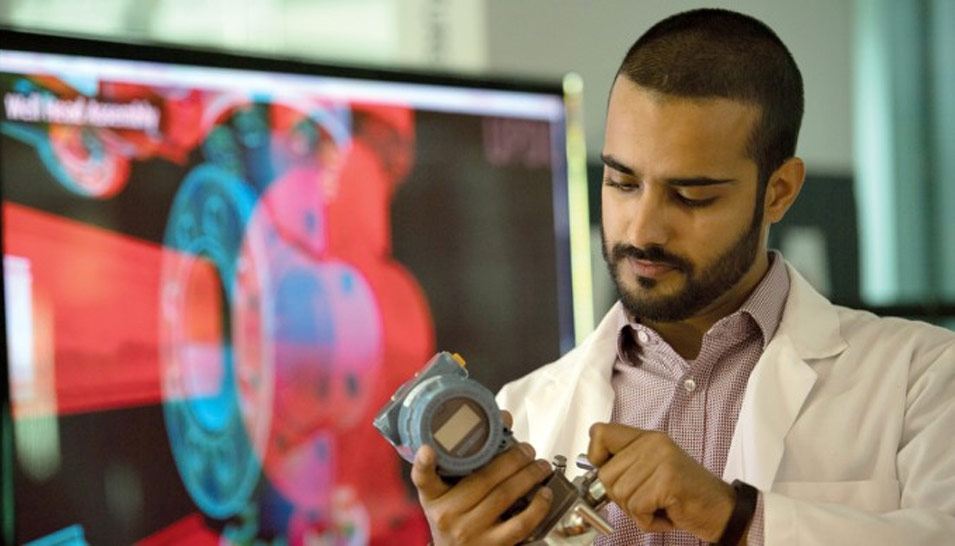
Awais Iqbal takes advantage of Saudi Aramco's e-factory lab to explore how he can take the technological prototype of his invention into the marketplace. Iqbal is a graduate of the first cohort of the company's three-day Innovation Professional Certification program.
What do you get when you put an inventor, industrial design specialist, patent attorney, commercialization and licensing specialist, and entrepreneurial specialist together in one room for three days? The answer is the ultimate mentorship accelerator for taking great ideas to market.
Add 30 engaged, empowered and energized participants to the mix, and you have the ultimate group to navigate a robust innovation ecosystem. The outcome is an Innovation Professional Certification, with the next cohort planned for August. To date, this certification has resulted in a total of nine startup companies.
In the latest certification workshop, participants were placed in three startup companies and awarded a mock seed fund of $100,000, and then asked to worked their way through the eight sectors of the Saudi Aramco innovation ecosystem.

Members of the “Cyber Spartans” startup discuss their strategy for the accelerator sessions where they had a chance to earn extra funding via the virtual banking system.
Professionals Take The Lead

Rakan H. Al Maghribi, a member of the
“Nomu Technologies” startup, showcases
various technologies for a predictive safety
platform to reduce the risk of injuries on the
job during the most recent cohort of Saudi
Aramco’s Innovation Professional
Certification program.
The content, delivery and expertise for the certification came from the collaboration of dedicated Saudi Aramco professionals who have been developing this master plan for many years. These professionals included representatives from our Technology Commercialization Group, Management and Professional Development Department, Law, Saudi Aramco Energy Ventures and our entrepreneurial center Wa'ed Venture Capital.
Each startup randomly selected a specific challenge based on a core theme of “futures.” The challenges range from a rethinking of current business processes, National Transformation Program 2020 objectives, and Vision 2030 strategic objectives. The critical success factor for day one was to design and develop a 1-D word cloud or write-up, 2-D drawing or sketch, and a 3-D model based on a service, product or platform that the startup was going to deliver.
In doing so, the team navigated through the four zones of ideation/discovery, tinker, maker, and proof of concept, intellectual property (IP). Each startup had to flex its entrepreneurial muscles since there were specific charges incurred throughout the journey. These charges included studio rental fees, material fees, in addition to mentoring and consultation charges.
There were six “seed-fund accelerator” sessions during which startups could inject more funds by playing the “wheel of innovation” game and answering specific questions, based on the core learning objectives. The startup could win prizes that ranged from instant cash injections to awards and grants.
Startups were also tempted to spend their well-earned seed fund via an innovation auction, which included various items that would give companies a competitive advantage.
Inspired By Success

Members of the “Wasla” startup negotiate the
business model as they navigate the eight
sectors of innovation. At the conclusion of the
Innovation Professional Certification program,
96% of the participants stated that they would
feel confident in using the tools in their
respective workplaces.
Throughout the three days, the startups were energized by inspirational local CEOs and international speakers. While the startups were busy working at developing and finalizing their prototypes, they were visited by the Saudi Aramco professionals who were on hand to share skills, advice and knowledge, from how to develop the best investor pitch to information on IP and legal licensing issues.
The startups had their eye on the target and were aware that they had to pitch their products and services to a team of investors called “sharks” — similar to the TV show, Shark Tank. The sharks were various managers and local CEOs with a wealth of experience in innovation, venture capital and entrepreneurship. The caliber and excellence of the final investor pitches were a great reflection of the level of learning and the application of skills and knowledge gained throughout the certification.
“It has been always a dream to see Saudi Aramco transforming its innovation into businesses. With the Shark Tank experience, we all have witnessed how a little contribution can make a differentiated impact, said Saif Al Saif, who is with the Technology Commercialization Group. “To see Saudi Aramco young talent pitching their ideas is remarkable, and it is a step in the right direction toward transforming our standard operations into commercial opportunities. This is the significant groundwork that will contribute in sustaining this innovation ecosystem and impacting Vision 2030.”
It was evident by the feedback that this certification proved to be successful. 96% of participants stated that they felt confident in taking the tools and applying them in their workplaces.
An Eye On The Future
Never before has it been more critical to create a learning mindset culture with an entrepreneurial flair to meet the challenges facing Saudi Aramco and the Kingdom. Saudi Aramco implemented its 2020 Strategic Intent to align the foundations to become a fully integrated, global energy enterprise.
Saudi Aramco’s growth aspirations are taking place within the larger context of Vision 2030, which seeks to reinforce and diversify the country’s economy. These ambitious game changers compel us to challenge our ability to innovate, become agile and embrace change. Creating and sustaining a robust, innovative, and forward-thinking culture will ensure a highly engaged, energized and productive workforce that will successfully navigate the company’s and Kingdom’s future aspirations.